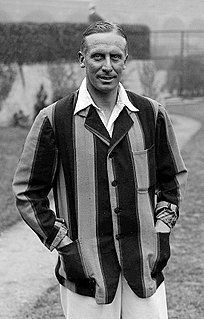
Arthur Edward Robert Gilligan was an English first-class cricketer who captained the England cricket team nine times in 1924 and 1925, winning four Test matches, losing four and drawing one. In first-class cricket, he played as an amateur, mainly for Cambridge University and Sussex, and captained the latter team between 1922 and 1929. A fast bowler and hard-hitting lower order batsman, Gilligan completed the double in 1923 and was one of Wisden's Cricketers of the Year for 1924. When his playing career ended, he held several important positions in cricket, including that of England selector and president of the Marylebone Cricket Club (MCC). A popular figure within cricket, he was widely regarded as sporting and friendly. During his playing days, Gilligan was a member of the British Fascists. He came to the notice of the Australian secret service during the 1924–25 MCC tour, and it is possible he helped to establish small fascist groups in Australia. It is unknown how long he remained a member, but the organisation practically ceased to exist by 1926.

Frank Hearne was an English born cricketer. One of the few men to play Test cricket for more than one country, he played for both England and South Africa. He was a member of the Hearne family of cricketers who played first-class cricket between 1879 and 1904 for Kent County Cricket Club and Western Province.
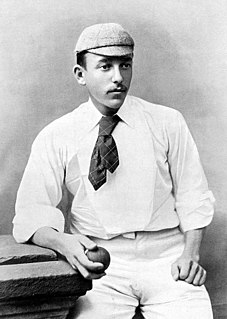
John Thomas Hearne was a Middlesex and England medium-fast bowler. His aggregate of 3061 first-class wickets is the greatest for any bowler of medium pace or above, and his 257 wickets in 1896 is the tenth highest total on record. In 1891, 1896, 1898, 1904 and 1910 Hearne headed the first-class bowling averages.
John Brian Statham, was an English professional cricketer from Gorton, in Manchester, who played for Lancashire County Cricket Club from 1950 to 1968 and for England from 1951 to 1965. As an England player, he took part in nine overseas tours from 1950–51 to 1962–63. He specialised as a right arm fast bowler and was noted for the consistent accuracy of his length and direction.

The Hearne family was a notable English cricketing family. Thirteen members of the family played first-class cricket, including five for Kent County Cricket Club and five for Middlesex County Cricket Club. Six played Test cricket: four for England, one for South Africa, and one represented both England and South Africa. Three members of the family were awarded the distinction of being names as Wisden Cricketers of the Year, J.T. Hearne in 1892, Alec Hearne in 1894 and J.W. Hearne in 1912. Other members also made notable contributions to the game.
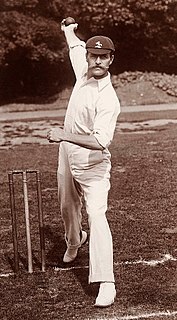
Alec Hearne was a member of the famous cricketing Hearne family. He played as a professional for Kent County Cricket Club between 1884 and 1906 and made one Test match appearance for England. He was an all-rounder who was named as one of Wisden's five Cricketers of the Year in 1894. His father, George played cricket for Middlesex during the 1860s and brothers George and Frank also played Test cricket, as did his cousin, John Thomas Hearne.

George Gibbons Hearne was an English professional cricketer who played first-class cricket for Kent County Cricket Club between 1875 and 1895. He also played in one Test match for England against South Africa in 1891/92. Hearne was part of the famous cricketing Hearne family. His brothers Alec and Frank also played Test match cricket.
Ernest Austin "Barberton" Halliwell was a first-class cricketer, who played eight Test matches for South Africa between 1892 and 1902, including three as captain. He played as a wicket-keeper, and was the first to put raw steaks inside his gloves to protect his hands. At his peak, he was considered one of the best wicket-keepers in the world, and was named one of the Wisden Cricketers of the Year in 1905. He was particularly praised for standing close to the wickets, even against fast bowlers.
James "Bonnor" Middleton was a South African cricketer who played in six Tests from 1896 to 1902. On his debut, he took five wickets in the first innings against England in Port Elizabeth in 1896.
Gustav Adolph Kempis was a South African cricketer who played in South Africa's inaugural Test match in March 1889.
An England team toured Australia between November 1920 and March 1921. The tour was organised by the Marylebone Cricket Club and matches outside the Tests were played under the MCC name. The tour itinerary consisted of 13 first-class matches, including a series of 5 Test matches against Australia in which The Ashes were at stake.
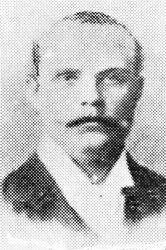
Herbert Hayton Castens was a South African rugby union footballer and cricketer. He captained South Africa at both rugby and cricket, and played an important role in the development of rugby and cricket in South Africa, both on and off the field. He was usually known as H. H. Castens.
1947 was the 48th season of County Championship cricket in England. It is chiefly remembered for the batting performances of Denis Compton and Bill Edrich who established seasonal records that, with the subsequent reduction in the number of first-class matches, will probably never be broken. Their form was key to their team Middlesex winning the County Championship for the first time since 1921, although they were involved in a tight contest for the title with the eventual runners-up Gloucestershire, for whom Tom Goddard was the most outstanding bowler of the season. Compton and Edrich were assisted by the fact that it was the driest and sunniest English summer for a generation, ensuring plenty of good batting wickets.
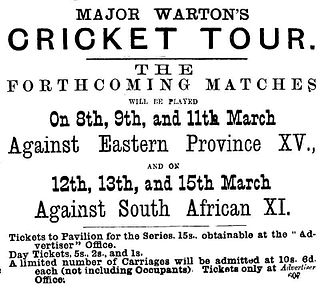
An English cricket team managed by Major R. G. Warton toured South Africa from December 1888 to March 1889. Warton was a retired British Army officer who had served on the general staff in Cape Town and was a member of the Western Province Cricket Club. He had been invited by local enthusiasts to bring a team of English first-class cricketers to the country. He negotiated with local agents called Billy Simkins and William Milton, who obtained sponsorship from Sir Donald Currie, founder of the Castle Shipping Line. They made all the arrangements while Warton travelled to England and recruited players for the team which, at the time, was known as R. G. Warton's XI.
An English cricket team, organised and led by the Surrey amateur Walter Read, toured South Africa from December 1891 to March 1892. There is uncertainty about the status of South African cricket as a whole in the late nineteenth century and so Read's matches against the main provincial teams, such as Transvaal and Western Province, are not rated first-class. The only first-class match on the tour is one in March against a South African national team which was retrospectively awarded Test status. Read's XI is therefore designated England for this match and they won the Test by an innings and 189 runs. The South African Test team was captained by William Henry Milton.
The tour by the English cricket team in South Africa in 1909–10 was organised by Marylebone Cricket Club (MCC). The team played as MCC in the non-Test fixtures and as England in the five Test matches. They played 14 first-class matches including the Tests, winning 7 times with 3 draws and 4 defeats.
The English cricket team in South Africa in 1913–14 was organised by Marylebone Cricket Club (MCC). The team played as MCC in the non-Test fixtures and as England in the five Test matches. They played 18 first-class matches including the Tests, winning 9 times with 8 draws and 1 defeat.
Variations in published cricket statistics have come about because there is no official view of the status of cricket matches played in Great Britain before 1895 or in the rest of the world before 1947. As a result, historians and statisticians have compiled differing lists of matches that they recognise as "unofficially" first-class. The problem is significant where it touches on some of the sport's first-class records and especially the playing career of W. G. Grace.
A cricket team from South America toured England, Scotland and Wales in the 1932 season. The team played six first-class matches and 12 other games. A seventh first-class match with Worcestershire was abandoned without a ball being bowled.
This article describes the history of New Zealand cricket from the 1945–46 season until 1970.








